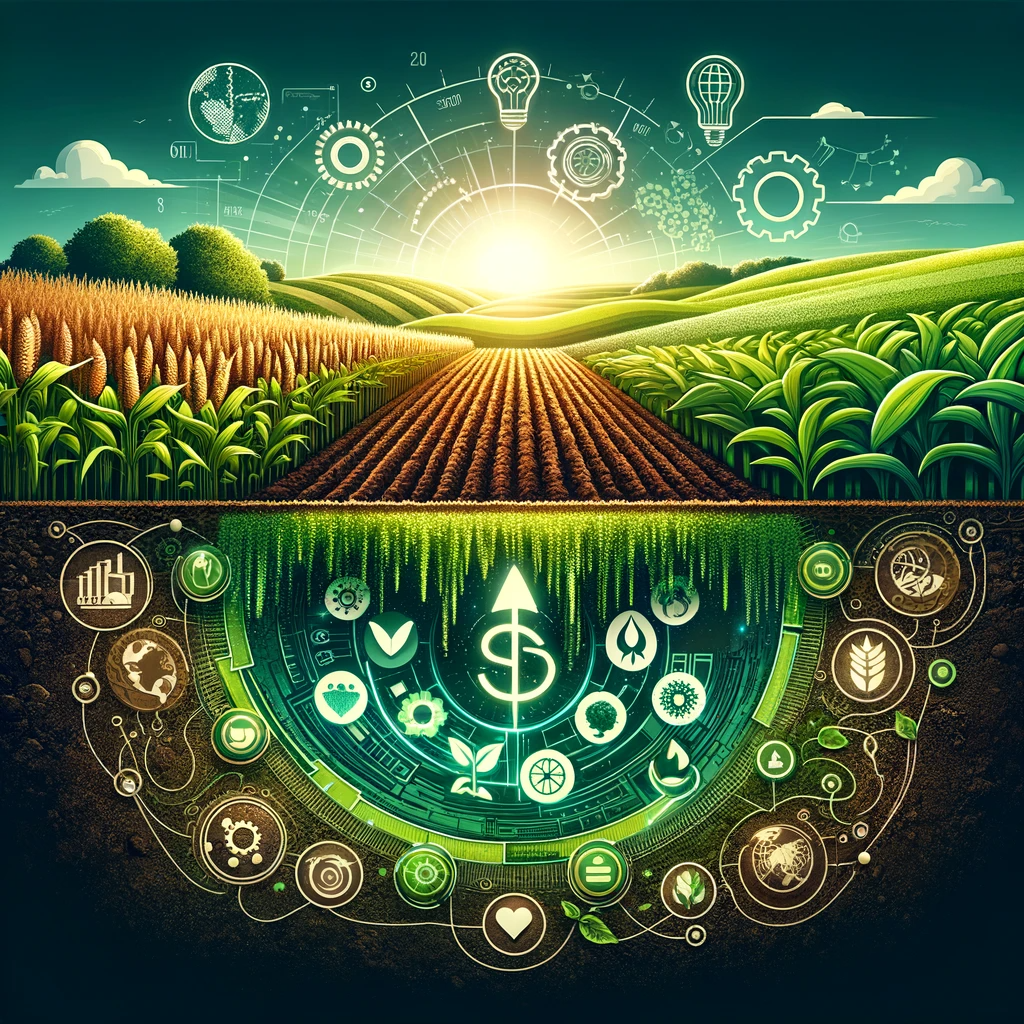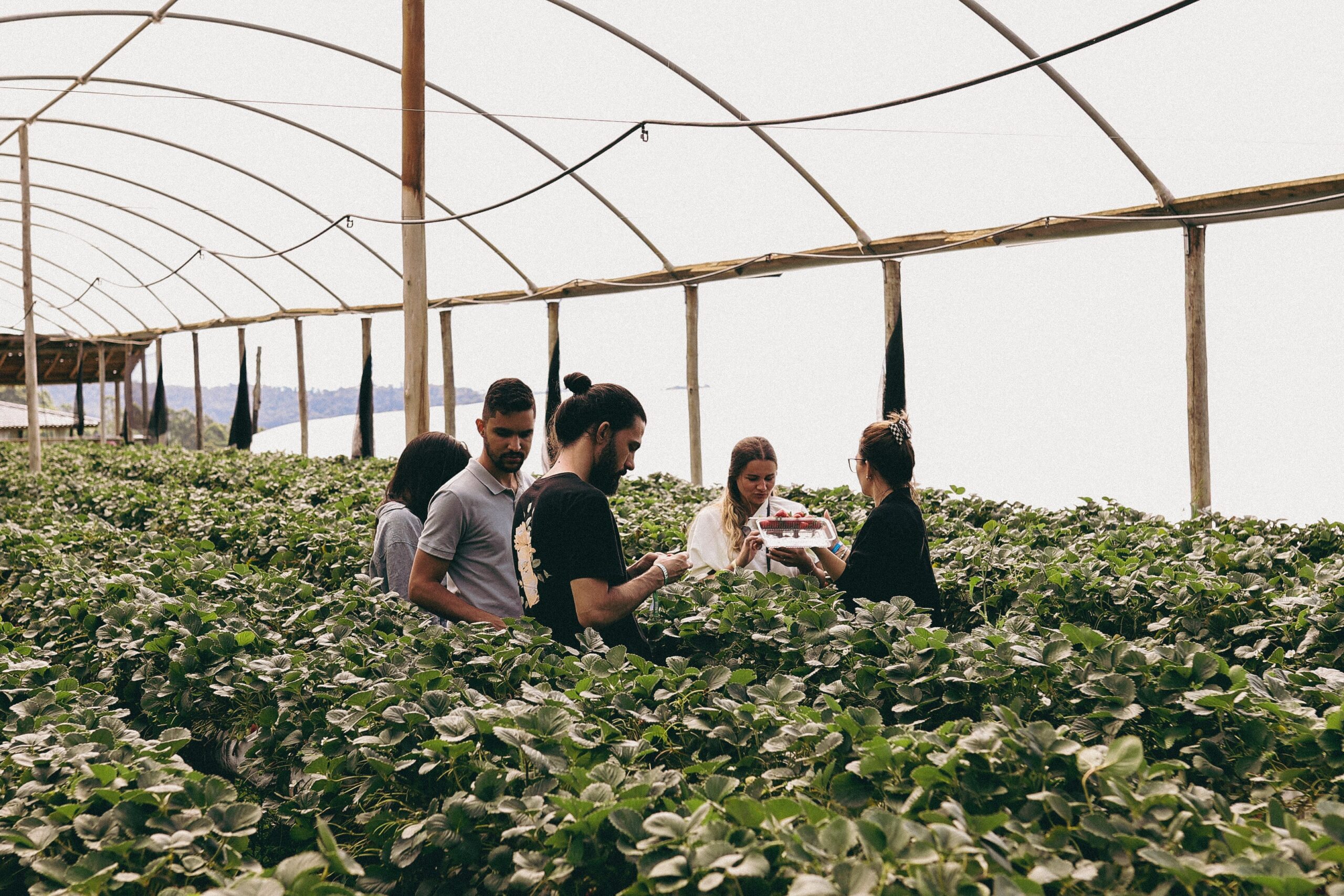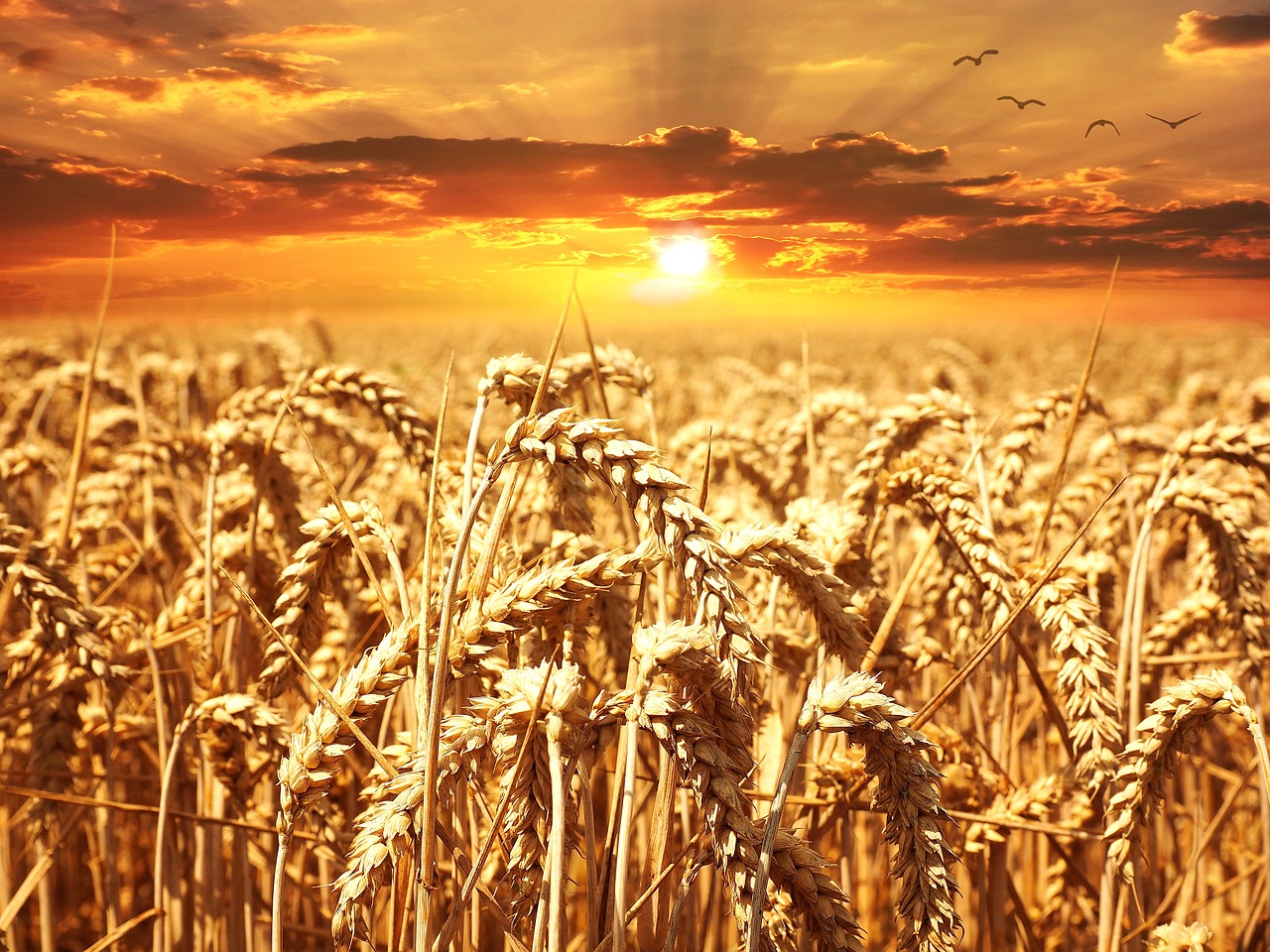Agriculture trade shows serve as pivotal platforms for farmers, agronomists, and companies to converge, share knowledge, and showcase the latest innovations in the field of agriculture. At the heart of these gatherings lies a subject of paramount importance – soil health. This very foundation of agriculture holds the key to sustainability, productivity, and environmental balance. In this blog, we will explore in depth why soil health is crucial, especially as highlighted in the global agriculture trade shows.
The concept of soil health transcends the mere presence of nutrients; it encapsulates a broader ecological perspective that involves sustaining plant life, water quality, and the global food web. Trade shows are not just about the exchange of products; they are educational arenas where the latest research and innovations in soil health are brought to light. As we delve into the multifaceted aspects of soil health, you’ll discover how every interaction with the soil can either contribute to its vitality or to its decline.
Soil Health Importance: The Cornerstone of Sustainable Agriculture
In every handful of fertile earth lies a microcosm of organisms, minerals, and organic matter, interacting in ways that are as complex as they are crucial for our survival. The emphasis of soil health importance at agriculture trade shows is not incidental; it is the acknowledgment of the soil’s pivotal role in nurturing life. Sustainable agriculture – the kind that meets today’s needs without compromising future generations – hinges on this very principle. But what makes soil health so critical?
First, soil health is an indicator of a sustainable ecosystem. Healthy soil teems with life and is a tapestry of biological activity, providing the necessary infrastructure for plants to grow. It’s a natural filtration system, a habitat for billions of organisms, a nutrient provider, and a carbon sink. At trade shows, this complex narrative is dissected, and solutions are paraded to address soil degradation – a quiet crisis unfolding globally.
Secondly, soil health bears direct implications for food security. As we gather in the vast halls of agriculture trade shows, surrounded by innovations aimed at boosting yields, we are reminded that without healthy soil, our efforts to feed a growing population are akin to building on quicksand. The nutrient density of our food, the resilience of crops to pests and disease, and the very fabric of agriculture rely on the vitality of the soil. Here, amidst the buzz of the trade show, soil health surfaces as a common denominator for global food security.
Lastly, soil health is about balance. In the push for increased production, soil can be easily overlooked, compacted, and stripped of life. Trade shows become arenas where this narrative is challenged. They highlight practices such as crop rotation, cover cropping, and reduced tillage – all of which contribute to restoring and maintaining this balance. It’s a silent revolution, whispered in the corridors and stands, where soil health is rightfully reinstated at the core of agricultural discourse.
Innovation Showcased: Soil Health Solutions at Trade Shows
Wandering through the vibrant displays and demonstrations at agriculture trade shows, one can’t help but marvel at the ingenuity on display. Innovations aimed at enhancing soil health are some of the most powerful tools in our arsenal against the degradation of our agricultural lands. These solutions come in various forms: from bio-fertilizers that enrich soil microbiota to precision agriculture tools that optimize soil management while reducing environmental impact.
One of the most talked-about innovations is the use of cover crops. Not a new concept by any means, but one that is being reinvigorated by scientific research and technological advancement. These crops protect soil from erosion, improve its structure, and increase biodiversity. They are the unsung heroes of soil health, and their importance is given the spotlight at these trade shows.
Moreover, the trend of digital soil mapping and analysis tools can be seen front and center. These tools offer a window into the soil’s soul, revealing its nutrient composition, moisture content, and pH levels. Farmers can now have a more informed relationship with their land, tailoring their cultivation methods to the specific needs of their soil, ensuring that they do not just take from the soil but also give back to it.
Additionally, discussions on organic farming practices often take center stage. The organic movement, which heavily emphasizes maintaining and improving soil health, is no longer a fringe element of agriculture but a mainstay in the conversation about the future of food production. These methods, including the use of organic matter like compost, promote a regenerative approach to farming, one that could potentially reverse the effects of soil degradation.
Networking for Soil Health: Collaborations Formed at Trade Shows
The networking opportunities provided by agriculture trade shows are unparalleled. It’s a meeting of minds, where farmers, scientists, policy-makers, and entrepreneurs can forge partnerships that have the potential to transform the landscape of agriculture. These collaborations are crucial in advancing our collective knowledge and application of soil health practices.
From small-scale farmers to representatives of agricultural giants, everyone brings a unique perspective to the table. It’s in these gatherings that a farmer from a remote village might find the perfect technology partner to help implement a soil health monitoring system on their land. Or a startup might meet their angel investor, keen on supporting sustainable agricultural innovations. The ripple effect of these connections can be monumental in advancing soil health importance on a global scale.
Furthermore, research institutions often find willing participants for their studies on soil health, ensuring their findings are grounded in practical, real-world applications. The transfer of knowledge from academia to the field is vital, and these trade shows act as conduits for such exchanges. It’s here that cutting-edge research is translated into actionable strategies that farmers can apply to their lands.
Lastly, the cross-pollination of ideas at these events cannot be understated. A conversation over coffee can lead to a collaborative effort that tackles soil erosion, or a panel discussion might spur a regional initiative to share best practices in soil conservation. These collaborative networks are the lifeblood of the agricultural community, and they often find their origin in the bustling corridors of agriculture trade shows.
Educational Workshops and Seminars: Spreading Knowledge on Soil Health
Education is a cornerstone of any trade show, and when it comes to agriculture, the workshops and seminars offer a treasure trove of knowledge on soil health. Here, attendees can immerse themselves in learning experiences that range from the fundamentals of soil science to the latest research findings and innovative soil health strategies.
Expert-led sessions dive into the intricacies of soil composition, helping attendees understand the delicate balance of nutrients and microorganisms required for optimal soil health. These workshops demystify the complex interactions within the soil ecosystem, providing practical insights that farmers can apply directly to their fields. By attending these sessions, one gains a holistic understanding of soil health’s importance, armed with the knowledge to make informed decisions that promote sustainable agricultural practices.
Moreover, seminars at trade shows often focus on the practical aspects of maintaining and improving soil health. Speakers share case studies and success stories, highlighting the tangible benefits of investing in soil health. Attendees leave not only with a deeper understanding of the concepts but also with actionable steps that can lead to healthier soil and, consequently, more robust crop yields.
In addition, these educational events foster a sense of community among those passionate about soil health. They create an environment where questions are encouraged, challenges are discussed, and solutions are collaboratively sought. For many farmers and stakeholders, these workshops and seminars are a source of inspiration and a catalyst for change, reinforcing the notion that soil health is a collective responsibility that requires shared effort and knowledge.
Soil Health Policies and Regulations: Discussions from the Trade Show Floor
Conversations at trade shows don’t stop at practical applications and innovations; they often extend into the realm of policy and regulation. The governance surrounding soil health is a critical component of the agricultural tapestry, with policies and regulations having the power to either nurture or neglect this vital resource.
Panels and forums at trade shows serve as melting pots for policy discussion, bringing to light the various legislative frameworks from around the world that govern soil health. These discussions can illuminate the successes and pitfalls of current policies, offering a panoramic view of how different regions approach soil conservation and health. It’s in these dialogues that attendees can gain insights into how policies can be shaped to incentivize sustainable practices, penalize soil mismanagement, or provide support for soil restoration projects.
The regulatory aspect of soil health often extends to discussions about subsidies for farmers who adopt soil-friendly practices, tax breaks for companies investing in soil health innovations, and the potential ramifications of trade agreements on soil management. These discussions can be eye-opening for many, revealing the intricate link between agricultural policy and the on-the-ground reality of farming.
Furthermore, these trade show discussions help in identifying gaps in current policies and offer a platform for stakeholders to voice their concerns and suggestions. In some cases, these interactions between policymakers, industry leaders, and farmers can lead to policy adjustments or the drafting of new regulations that better serve the interests of soil health.
It’s also in these policy-centered talks that the implications of global agreements on climate change, such as the Paris Agreement, are dissected with a focus on soil health. Attendees can learn about international commitments to soil health and how these are translated into national strategies and local actions.
These policy discussions are not just academic; they have real-world consequences, influencing how soil health is prioritized and managed on a global scale. As such, they are an indispensable part of the conversation at agriculture trade shows, shaping the future of soil health regulation and its implementation.
Global Perspectives on Soil Health: Learnings from International Trade Shows
Agriculture trade shows are global events that attract stakeholders from all corners of the world, offering a unique opportunity to understand how different cultures and countries approach the topic of soil health. The learnings from these international gatherings can be profound, offering a kaleidoscope of perspectives on how to manage and improve soil health.
From the terraced fields of Asia to the vast monocultures of the Americas, practices vary dramatically, and so do the challenges and solutions to maintaining soil health. At trade shows, these diverse practices are on display, allowing attendees to explore a wide array of approaches and learn from the successes and mistakes of others.
For instance, the principles of permaculture from Australia, which focus on working with natural ecosystems to create sustainable and self-sufficient agricultural systems, can offer valuable lessons in soil preservation and restoration. Similarly, the traditional practices of indigenous communities, which often involve a deep understanding and respect for the land, can provide insights into long-term soil health maintenance.
The sharing of global perspectives also brings attention to the universal threats to soil health, such as erosion, nutrient depletion, and contamination, and how they are being addressed across different landscapes. This sharing of knowledge and experience is crucial in developing a collective response to global soil health challenges.
Furthermore, international trade shows often spotlight the research and technological advancements coming out of different countries, showcasing how each contributes to the global knowledge base of soil health. Attendees can discover how soil health is monitored using advanced technologies in one country, or how another has developed policies to combat soil acidification.
The global exchange of information and practices at these trade shows is not just educational; it’s a call to action for all stakeholders to consider the global implications of soil health and to adopt a more holistic and internationally informed approach to soil management.
Soil Health Advocacy: Key Messages from Industry Leaders at Trade Shows
At the helm of every agriculture trade show are industry leaders who carry the torch for soil health advocacy. Their key messages resonate throughout the event, calling for a united front in the battle against soil degradation. These leaders utilize the platform to emphasize soil health importance, encouraging a shift in how we view our relationship with the land.
Their advocacy is often rooted in a blend of passion and science, urging attendees to consider the long-term implications of soil mismanagement. Through compelling speeches and interactive presentations, they inspire action and awareness, highlighting the necessity for soil conservation as a means to ensure food security, biodiversity, and ecological balance.
The messages conveyed by these thought leaders often revolve around the concept of stewardship, reminding us that we are mere custodians of the land, with a responsibility to pass on healthy soil to future generations. They call for sustainable management practices, investment in soil health research, and a more integrated approach to agriculture that places soil at the center of all decisions.
Moreover, they challenge the status quo, pushing for innovation and a departure from harmful practices that threaten soil vitality. They also celebrate the achievements of those who have made significant strides in improving soil health, thereby setting a benchmark for others to follow.
The advocacy from industry leaders at trade shows does more than just raise awareness; it galvanizes a movement, propelling soil health to the forefront of agricultural priorities. It’s their messages that often spark new initiatives, influence policy-making, and drive the industry toward a more sustainable future.
Success Stories: Case Studies of Soil Health Improvement Presented at Trade Shows
Amidst the expanse of booths and exhibits, success stories of soil health improvement shine as beacons of hope and inspiration. These case studies, meticulously presented at trade shows, are not mere anecdotes; they are evidence of the triumphs achieved through dedication to soil health.
These narratives often begin with a challenge—depleted soils, erosion, or productivity loss—followed by the strategies employed to overcome these hurdles. They detail the journey of implementing soil health practices, such as crop rotation, no-till farming, or the application of organic matter, and the positive outcomes that ensued.
The case studies are replete with data and analysis, underscoring the tangible benefits of focusing on soil health. Increased crop yields, improved water retention, enhanced biodiversity, and resilience against climate change are common themes. They serve as proof that with the right approach, soil can be regenerated, even after years of neglect.
Furthermore, these success stories are a source of practical knowledge, providing a blueprint for others to replicate. They break down the process into actionable steps, offering a roadmap that attendees can adapt to their unique contexts.
These case studies also have a motivational effect, illustrating that change is possible and that individual efforts can lead to substantial improvements in soil health. They affirm the soil health importance mantra that echoes through the halls of the trade show, encouraging others to embark on their soil health journey.
Final Thoughts on Soil Health Importance: The Charge Forward from Agriculture Trade Shows
As the curtains close on another agriculture trade show, attendees leave with a renewed sense of purpose and a charge forward to prioritize soil health. The event serves as a catalyst for action, with the collective experiences, knowledge, and inspiration converging to empower stakeholders to make a difference.
The charge forward is not just about individual action; it’s about collective progress. It’s a recognition that soil health is the foundation upon which sustainable agriculture is built and that it requires a concerted effort to protect and enhance this critical resource.
Trade shows reiterate the soil health importance, reminding us that every decision made on the farm, in the laboratory, or in the halls of government has implications for the soil. The charge is to take this message and turn it into a reality, implementing the practices, policies, and partnerships necessary to ensure the health of our soils for generations to come.
The commitment to soil health seen at these trade shows is a beacon of hope, signaling a shift towards more sustainable and regenerative agricultural practices. It’s a charge that echoes beyond the trade show walls, into the fields and the future of farming.
Conclusion
Agriculture trade shows are not just about the latest equipment or the most innovative technology; they are also about bringing to light the soil health importance. They provide a platform for education, networking, policy discussion, and the sharing of success stories. Each event contributes to the global conversation on how to maintain and improve the health of our soils.
As we reflect on the role of these trade shows in promoting soil health, it’s clear that they are an invaluable resource for the agricultural community. They catalyze change, foster collaboration, and highlight the necessity of prioritizing soil health in all agricultural endeavors.
So, let us take the insights, inspiration, and information gained from these events and turn them into meaningful action. The soil beneath our feet is not just a commodity; it’s a living, breathing entity that sustains us all. The importance of soil health cannot be overstated, and the charge from these trade shows is clear: protect, nurture, and enhance our soils, for in doing so, we secure the future of agriculture and the well-being of our planet.
And with that, we conclude this in-depth exploration of agriculture trade shows and the importance of soil health. May the dialogue continue, the knowledge expands, and the commitment to our soils grow stronger with each passing season.
We welcome any suggestions or questions. You can email us or contact us using the contact page.
You can also connect with us on the following social networks:









0 Comments